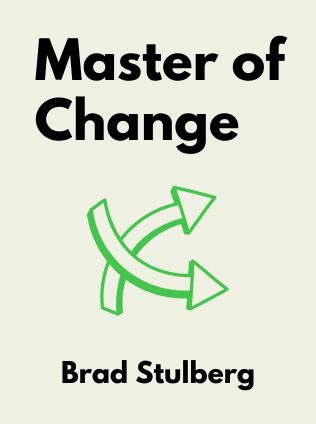
Master of Change
How to Excel When Everything Is Changing – Including You
By Brad Stulberg
Published 09/2023
About the Author
Brad Stulberg is a respected author, speaker, and coach who specializes in human performance and well-being. His work focuses on the intersection of science, philosophy, and personal development, offering practical advice for achieving excellence in all aspects of life. Stulberg is known for his insightful articles published in leading outlets like The New York Times, TIME, and The Wall Street Journal. He has co-authored popular books such as "Peak Performance" and "The Passion Paradox," which explore the science of success and the complexities of finding and maintaining passion in life.
Stulberg's approach is characterized by a deep commitment to research and a holistic understanding of human psychology. He integrates findings from various fields, including psychology, neuroscience, and ancient wisdom traditions, to offer a comprehensive view of personal growth and resilience. His work is particularly relevant in today's fast-paced world, where change is constant and often overwhelming. Through his writing and speaking engagements, Stulberg aims to equip individuals with the tools and mindsets necessary to navigate life's challenges and achieve meaningful, sustained success.
Main Idea
"Master of Change: How to Excel When Everything Is Changing – Including You" explores the inevitability of change and how individuals can not only cope but thrive in its midst. Stulberg challenges the conventional notion of homeostasis, which suggests that people strive to return to a stable state after experiencing change. Instead, he advocates for allostasis, a process where individuals adapt to change, creating a new normal. This concept underscores the idea that change is not an interruption but a fundamental part of life. The book emphasizes the importance of cultivating a mindset of rugged flexibility, which combines resilience with the ability to adapt and grow through change.
Table of Contents
- Introduction
- Understanding Change: Homeostasis vs. Allostasis
- The Power of Expectations
- Tragic Optimism: Finding Meaning in Suffering
- Resistance and Acceptance
- The Fluid Self
- Boundaries and Core Values
- Responding vs. Reacting
- Activation Energy and Small Actions
- Dealing with Serious Adversity
- Tools for Embracing Change
Understanding Change: Homeostasis vs. Allostasis
Stulberg begins by contrasting homeostasis with allostasis, two concepts that describe different responses to change. Homeostasis is a state of stability where systems resist change to maintain equilibrium. In contrast, allostasis involves a dynamic adjustment to new conditions, allowing for growth and adaptation. This shift from a static to a dynamic view of stability is crucial for understanding how to navigate life's inevitable changes.
Stulberg uses the metaphor of a river to illustrate these concepts. In homeostasis, the goal is to keep the river's flow constant, resisting any changes in water level or direction. However, life is more like a river in allostasis, where the flow changes with the seasons, and the river carves new paths. This metaphor highlights the importance of being flexible and adaptive, rather than rigid and resistant, in the face of change.
"Order, disorder, reorder – this is the natural rhythm of life. Embracing this rhythm allows us to thrive amidst change." – Brad Stulberg
The Power of Expectations
Expectations play a critical role in shaping our experiences and emotional responses. Stulberg explains that our happiness often depends on the gap between our expectations and reality. This concept, rooted in psychological research, suggests that managing expectations is crucial for maintaining emotional equilibrium. When our reality exceeds expectations, we feel joy; when it falls short, we experience disappointment.
To illustrate this point, consider the following scenarios:
Sign up for FREE and get access to 1,400+ books summaries.
You May Also Like
The Subtle Art of Not Giving a F*ck
A Counterintuitive Approach to Living a Good Life
By Mark MansonRich Dad Poor Dad
What the Rich Teach Their Kids About Money - That the Poor and Middle Class Do Not!
By Robert T. KiyosakiHow To Win Friends and Influence People
The All-Time Classic Manual Of People Skills
By Dale CarnegieFreakonomics
A Rogue Economist Explores the Hidden Side of Everything
By Steven D. Levitt and Stephen J. Dubner



















